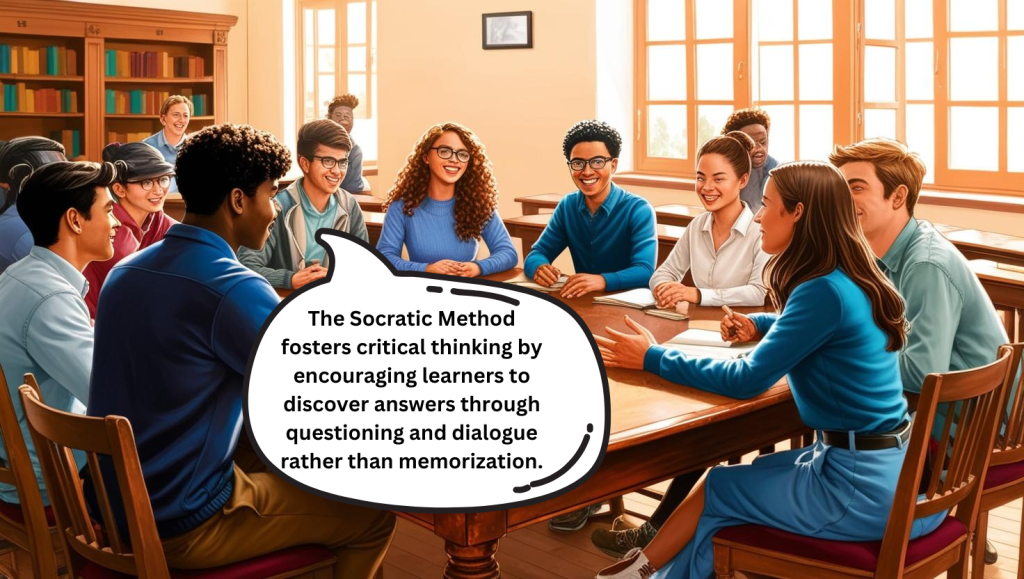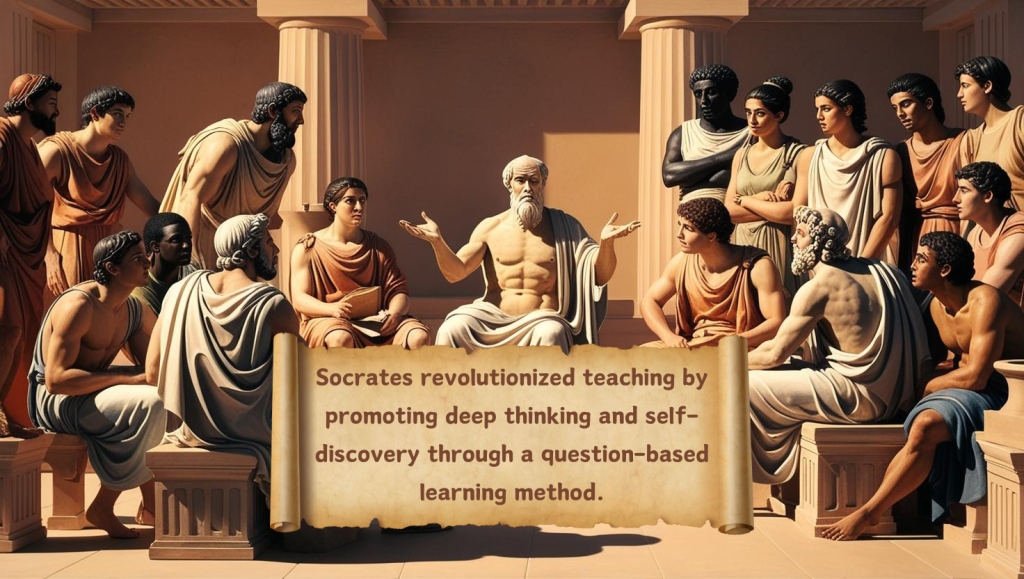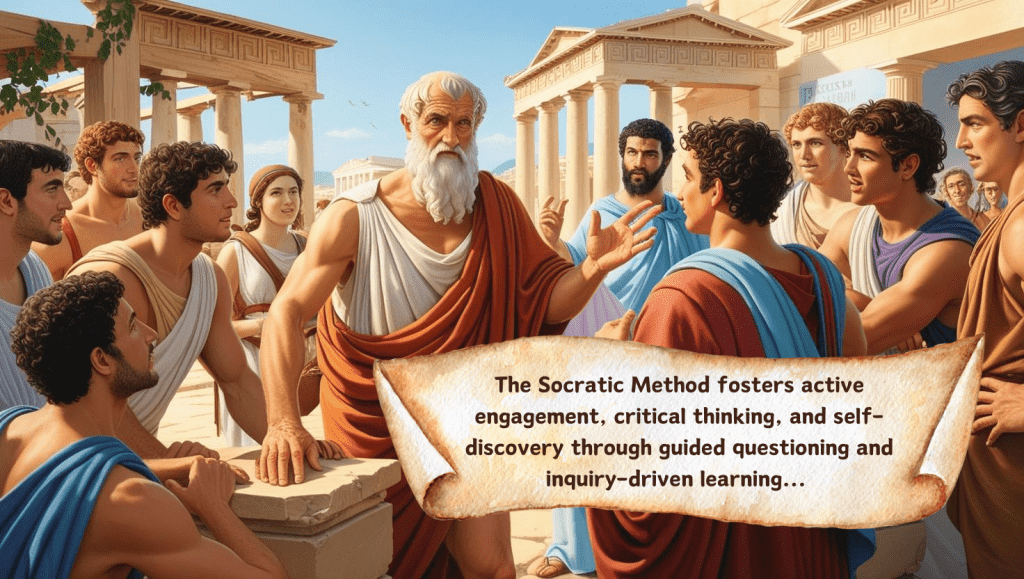From Ancient Wisdom to AI-Powered Learning with Socratic AI
The Socratic Method, rooted in ancient Greek philosophy, is a timeless teaching approach that promotes critical thinking through thoughtful questioning. Over the years, it has shaped education in law, liberal arts, and more.
Today, platforms like Socratic AI bring this method into the digital age, using AI to personalize learning and make it accessible to everyone. This article explores the journey of the Socratic Method from its origins to its transformation through modern technology.
Introduction to the Socratic Method

The Socratic Method is a way of teaching that encourages critical thinking through questioning and dialogue. It was created by the ancient Greek philosopher Socrates, who believed in finding the truth through discussion. This method helps learners discover answers on their own instead of just memorizing facts.
How Socrates Revolutionized Teaching

Socrates transformed education by emphasizing questioning over providing direct answers. His approach, now known as the Socratic Method, encourages learners to think critically and independently. By posing thoughtful questions, Socrates aimed to foster deeper understanding and self-reflection. This philosophy laid the groundwork for inquiry-based learning, which empowers students to actively engage with ideas and discover knowledge themselves. Socrates believed that through dialogue, individuals could achieve profound intellectual growth, making his method a cornerstone of modern educational practices.
Core Principles of the Socratic Method

The Socratic Method centers on critical thinking, inquiry-driven learning, and intellectual curiosity. It relies on guided questioning to stimulate reflection and reasoning in students. Rather than passive listening, this approach promotes active engagement and thoughtful exploration of complex topics. By encouraging learners to ask and answer their own questions, it cultivates a habit of self-discovery and the development of well-rounded perspectives. These principles remain fundamental in fostering meaningful and interactive learning experiences.
Traditional Applications in Education
Educational institutions, especially law schools and liberal arts programs, have long relied on the Socratic Method to spark intellectual discussions. Professors use this technique by posing challenging questions that require critical thought and nuanced responses. The method is particularly effective in small, discussion-based settings, where students can openly engage with ideas and defend their reasoning. Its success in encouraging active learning has made it a staple in higher education, emphasizing the importance of dialogue in developing analytical skills.
Limitations of Classic Socratic Teaching
While effective, the traditional Socratic Method faces challenges in scalability and inclusivity. It requires significant time and effort, which can limit its feasibility for large or diverse classrooms. Additionally, the method may not always accommodate varying learning styles, making it less accessible for some students. These constraints highlight the need for more adaptable tools to implement Socratic teaching on a broader scale.
The Evolution of Educational Technologies
Advancements in educational technology have modernized the Socratic Method, making it more accessible and scalable. Digital tools now enable interactive learning experiences, replicating the principles of Socratic dialogue. These innovations have expanded the reach of inquiry-based education, allowing teachers to engage with students more effectively, regardless of location or class size.
The Evolution of Educational Technologies
AI-powered platforms like Socratic AI bring the Socratic Method into the digital age. These platforms use advanced algorithms to simulate Socratic questioning, offering personalized, dynamic learning experiences. By engaging students in interactive dialogue, AI tools replicate the depth and flexibility of traditional methods while addressing the limitations of scale and accessibility. This blend of AI and pedagogy opens new possibilities for more effective learning.
Key Features of Socratic AI’s AI Tools
Socratic AI offers innovative tools to enhance learning, including photo input, multi-subject assistance, and step-by-step guidance. These features empower students to seek help with complex problems and gain a clear understanding of various topics. By integrating these tools, Socratic AI makes personalized learning accessible and user-friendly, aligning with modern educational needs.
Benefits of AI-Powered Dialogue Learning
AI-driven dialogue learning adapts to the needs of individual students, providing tailored, efficient, and engaging experiences. Unlike traditional methods, it allows learners to progress at their own pace, ensuring deeper comprehension. This adaptability helps students master subjects more effectively, making AI-powered tools a game-changer in personalized education.
Visual Learning Tools: Enhancing Understanding
Socratic AI incorporates visuals like videos, diagrams, and charts to simplify complex concepts. These visual aids make learning more interactive and engaging, ensuring that students can grasp abstract ideas with ease. By combining visual and dialogue-based learning, the platform offers a holistic educational experience.
Traditional vs. AI-Driven Socratic Methods
AI-driven Socratic methods offer scalability, accessibility, and a superior user experience compared to traditional approaches. They allow large numbers of students, including those in remote areas, to benefit from Socratic teaching. By overcoming physical and logistical barriers, AI tools democratize access to high-quality, inquiry-based learning.
Real-Life Applications of AI Socratic Teaching
Platforms like Socratic AI support students in exam preparation, problem-solving, and everyday study needs. Through AI-driven questioning, students can strengthen their understanding of difficult subjects and enhance their academic performance. These practical applications make AI-powered tools invaluable for modern learners.
The Future of AI in Education
AI promises to further transform education by offering increasingly personalized and effective learning solutions. As technology advances, it will address individual learning gaps, making education more inclusive and accessible. The integration of AI into education ensures that students receive support tailored to their specific needs, paving the way for a more equitable learning environment. Learn more about the future of learning with Socratic.
Bridging Learning Gaps with Socratic AI
Socratic AI focuses on addressing individual challenges, providing customized assistance to help students excel. Its AI-powered tools enable learners to overcome obstacles in their education journey, ensuring they achieve their academic goals. This targeted support reflects the platform’s commitment to making education more effective and inclusive for all.
Preserving the Legacy of the Socratic Method Through Technology
Platforms like Socratic AI carry on Socrates’ mission in the digital age by making his method accessible to a wider audience. Through AI-powered tools and technology, the Socratic Method continues to thrive and help students learn more effectively.
In conclusion, the Socratic Method has stood the test of time as a powerful tool for fostering critical thinking and intellectual growth. With the integration of modern technologies like AI, platforms such as Socratic AI are bringing this ancient teaching method into the digital age, making it more accessible, personalized, and scalable. By continuing to embrace these advancements, we can ensure that the legacy of Socrates lives on, helping learners of all ages unlock their potential and develop the skills needed for success in the future.